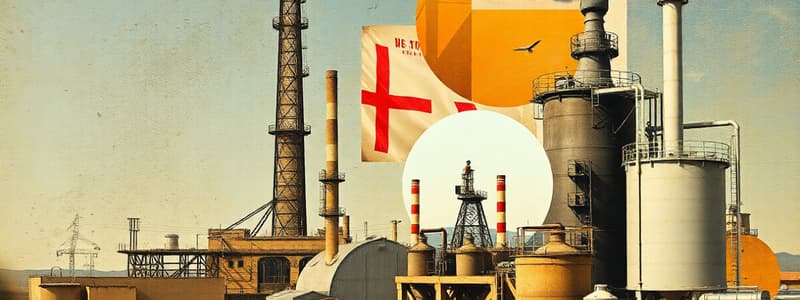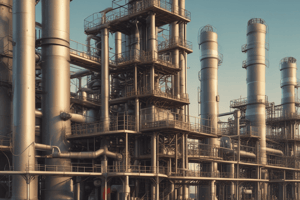Podcast
Questions and Answers
What is the primary goal of maintaining mercury levels below 0.001 ppb in natural gas processing?
What is the primary goal of maintaining mercury levels below 0.001 ppb in natural gas processing?
- To enhance the flavor of natural gas
- To improve gas coloration
- To avoid damaging equipment (correct)
- To increase production speed
Natural gas that contains only CO2 and no other sulfur compounds is classified as sour gas.
Natural gas that contains only CO2 and no other sulfur compounds is classified as sour gas.
False (B)
What are the two main stages involved in natural gas processing?
What are the two main stages involved in natural gas processing?
Gas treatment (or conditioning) and gas processing.
Natural gas processing removes __________ of components such as hydrogen sulfide and carbon dioxide.
Natural gas processing removes __________ of components such as hydrogen sulfide and carbon dioxide.
Match the following natural gas processing techniques with their descriptions:
Match the following natural gas processing techniques with their descriptions:
Which component must be kept at trace amounts to prevent the formation of methane hydrates in gas processing?
Which component must be kept at trace amounts to prevent the formation of methane hydrates in gas processing?
The presence of nitrogen in natural gas is generally desired during the processing stage.
The presence of nitrogen in natural gas is generally desired during the processing stage.
Natural gas containing fewer than 5.7 milligrams of H2S per cubic meter is classified as __________.
Natural gas containing fewer than 5.7 milligrams of H2S per cubic meter is classified as __________.
Which of the following methods is NOT classified as a natural gas sweetening technique?
Which of the following methods is NOT classified as a natural gas sweetening technique?
The Claus process is used for removing carbon dioxide from natural gas.
The Claus process is used for removing carbon dioxide from natural gas.
What is one major advantage of natural gas compared to coal?
What is one major advantage of natural gas compared to coal?
Natural gas is the cleanest-burning hydrocarbon.
Natural gas is the cleanest-burning hydrocarbon.
What is the primary purpose of an amine treating unit in natural gas processing?
What is the primary purpose of an amine treating unit in natural gas processing?
The process used for mercury removal in natural gas involves _ processes.
The process used for mercury removal in natural gas involves _ processes.
What are two primary uses of natural gas in industries?
What are two primary uses of natural gas in industries?
Match the following gas processing techniques with their functions:
Match the following gas processing techniques with their functions:
Natural gas needs to be purified to meet the __________ set by pipeline companies.
Natural gas needs to be purified to meet the __________ set by pipeline companies.
Match the following uses of natural gas with their applications:
Match the following uses of natural gas with their applications:
What is the role of the Tail Gas Treating Unit (TGTU)?
What is the role of the Tail Gas Treating Unit (TGTU)?
Natural gas processing has no significant environmental impact.
Natural gas processing has no significant environmental impact.
What is the heating value of natural gas expected to be in the United States?
What is the heating value of natural gas expected to be in the United States?
List one by-product obtained from the NGL recovery process.
List one by-product obtained from the NGL recovery process.
Gas-fired power stations experience greater noise and longer startup times than coal-fired plants.
Gas-fired power stations experience greater noise and longer startup times than coal-fired plants.
What is the primary purpose of natural gas processing?
What is the primary purpose of natural gas processing?
Flashcards are hidden until you start studying
Study Notes
Natural Gas Processing Overview
- Natural gas processing is a complex and expensive process that involves removing various components from the raw gas.
- The first stage is gas treatment, where components like hydrogen sulfide (H2S), carbon dioxide (CO2), nitrogen (N2), and water vapor are removed.
- The second stage is gas processing, where hydrocarbons, known as natural gas liquids (NGL), are separated. The remaining methane is then marketed as natural gas.
Gas Sweetening
- Sour gas contains more than 5.7 milligrams of H2S per cubic meter of natural gas.
- Sweet gas contains only CO2 and no other sulfur compounds.
- Removing H2S and CO2 is crucial to prevent corrosion and increase the heating value of the gas.
- There are three main methods for gas sweetening: reactive chemical solvents, physical methods, and other methods.
Gas Dehydration
- Water vapor removal is essential to prevent the formation of methane hydrates.
- Two common methods include:
- Glycol dehydration using triethylene glycol (TEG)
- Pressure swing adsorption (PSA)
NGL (Natural Gas Liquids) Recovery and Fractionation
- NGL recovery uses a cryogenic low-temperature distillation process involving gas expansion through a turbo-expander.
- NGL fractionation involves three distillation towers in series:
- Dethanizer: separates ethane
- Depropanizer: separates propane
- Debutanizer: separates normal and isobutane, and C5+ mixture
Mercury Removal
- Mercury is removed using adsorption processes.
Nitrogen Removal
- Nitrogen removal can be achieved through various methods:
- Cryogenic process: using low-temperature distillation; can also recover helium.
- Absorption process: using lean oil or a special solvent.
- Adsorption process: using activated carbon or molecular sieves; limited applicability due to potential loss of butanes and heavier hydrocarbons.
Other Important Components
- LNG (Liquefied Natural Gas): Natural gas cooled to a liquid state for transport and storage.
- NGL (Natural Gas Liquids): Heavier gaseous hydrocarbons included in the raw natural gas stream.
- LPG (Liquefied Petroleum Gas): Gas that is liquid at room temperature with some pressure.
Advantages of Natural Gas
- Cleaner burning hydrocarbon, producing less CO2 and air pollutants than coal.
- Does not produce ash.
- High heating value of 24,000 Btu per pound.
- Gas power plants have faster start-up and shut-down times compared to coal plants.
- Cheaper to produce than coal.
Gas Usage
- Electricity Generation: Modern gas-fired power plants are cleaner, more efficient, cheaper to build, less noisy, and emit less pollution.
- Petrochemical, Steel, and Fertilizer: Used to produce ethylene, propylene, ammonia, etc.
- Transport Fuel: Used in vehicles as a cleaner alternative to gasoline.
- Residential Gas Markets: Used for heating, cooking, and water heating.
Natural Gas Quality Standards
- Heating value: Should be around 1,035 ± 5% Btu per cubic foot at 1 atmosphere and 60 °F (for the United States).
- Hydrocarbon dew point: Gas must be delivered at or above a specified dew point temperature to prevent liquid condensation in pipelines.
- Purity: Should be free of particulate solids and liquid water to avoid corrosion and damage to pipelines.
Studying That Suits You
Use AI to generate personalized quizzes and flashcards to suit your learning preferences.




